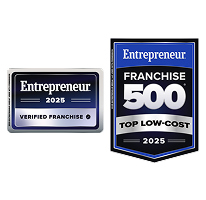If you’re thinking of investing in your own insurance franchise in association with a leading-brand franchisor, you might be on the right track. After all, the insurance franchise ROI, or return on investment, can be quite generous.
While it’s highly variable, you could earn a 50% annual return on your original investment. From there, there are no barriers to what you might bring home. But before you get to the good news of franchise ROI, you must first devote adequate funding to your goal.
Understanding the Costs of a Franchise
The overall investment to own and start up your business will vary greatly depending on your location, the reputation of the franchisor, and other factors. But this will give you a ballpark estimate of how much it costs to buy a franchise and get it started.
Initial Fees and Startup Costs
It’s best to always estimate on the higher side of your costs: From planning through your grand opening, your insurance start-up could range from the low to the high thousands. This estimate includes your upfront franchise fee and everything you’ll need by the time you put your sign on the door and open for business.
Depending on who you choose to franchise with, your largest investment may be that franchise fee. This can range on the lower end from $25,000 all the way up to more than $60,000. This represents the initial cost of becoming a franchisee. It should pay for what you expect to be a well-known and respected brand, an appealing insurance product inventory, a built-in audience, and the training, ongoing support, and guidance from a company that’s already earned the level of success that you wish to emulate.
If you’ve chosen the right franchise to own, you’ll find this investment to be worthwhile.
In addition to your franchise fee, other initial investment components will include the usual costs associated with starting any business. But one advantage of the insurance franchise model is that those startup costs can be quite minimal. You might open for business with a sole employee (you) operating off the kitchen table of your apartment. Only when you get busier do you need to think about office leases and adding to your workforce.
Ongoing Operational Costs
This refers to working capital. You won’t immediately begin to turn a profit, of course. That means you must have additional funds set aside to pay for your ongoing business costs and to provide you with at least enough of a salary to put food on the table.
Your first step is to determine what those costs are. Start noting the bills you must pay and the personal expenses you can’t put off until you realize an adequate franchise return on investment.
You’ll also pay ongoing royalty fees on the franchisor’s insurance products. That’s the franchisor’s cut of the action since you’ll be selling products that have already earned a name and recognition. Royalty payment agreements are all over the board. Some franchisors charge the fee as a percentage of the revenue or profit after you sell their products. Others might charge you in advance in anticipation of how much you’ll sell. You might owe the fee monthly, quarterly, or by some other timeline.
It’s important to know how royalty fees will be charged before you sign any franchise agreement so you can plan your budget accordingly.
You might also have to contribute to your franchisor’s marketing and promotional campaigns. This can be a great investment, as it can boost brand awareness and acceptance and make your sales job easier.
Training and Licensing Expenses
The cost of earning an insurance license varies from state to state, but it’s likely to be at least $40 and not much more than $200.
After that, you’ll want ongoing product training, guidance, and support from your franchisor. That effort should just be a part of your franchise agreement and not cost you anything extra. In a good franchise model relationship, you and your franchisor are partners in the success of your business, so they’re happy to provide you with the insights and support you’ll need to thrive.
Additional Hidden Costs to Consider
As Gilda Radner used to say when portraying Roseanne Roseannadanna on Saturday Night Live, “It’s always something!” In this case, what it means is that you need to have as much funding set aside as possible for emergencies and other unplanned and unanticipated business expenses.
For instance, you might have to pay exclusivity fees to do business in a geographic location outside your territory. Or come up with cash for technology upgrades or compliance costs.
Your office rent might go up, or you may need to hire workers before you budget the expense. The point is, it’s impossible to say where an unexpected bill might come from, but you need to operate your business as though you planned the expense all along.
ROI: What Can Insurance Franchise Owners Expect to Earn?
What will you likely get for your not-insignificant investment? What will be your franchise return on investment?
Three Revenue Streams for an Insurance Franchisee
Your most obvious way of making money as an insurance franchise is by selling your franchisor’s products. When that happens, you’ll get an immediate commission.
Then, every time your customer renews a policy, you’ll cash in with another sales commission. If you sell someone a life insurance policy when they’re 30, you might still make residual commissions long after you’ve retired.
But why quit there? Once you have a satisfied customer, you can continue to sell or upsell them as their lives and needs change.
Take a customer to whom you sell an auto insurance policy on their first car while they’re still in college. Once out of school and they get that first career job, they move away from home, and you sell them renters insurance. Later, they get married and buy their first house. You’re there with homeowners insurance coverage. A few years later, when they start to have kids, you provide the young couple with life insurance.
Just make sure you buy a franchise from an insurance company that can offer an extensive and diverse product line at the rates your customers will appreciate.
The Break-Even Point — and Beyond

How long will it take your insurance franchise to earn back your startup costs and start making a profit? This is called the break even point. Reaching this point will depend on a lot of factors, including your initial startup costs, your sales ability and experience, the territory’s market potential, and the reputation of the company and brand you’ve adopted.
Some independent agents who bring customer relationships into a franchise with them could break even – and even start turning a profit – fairly early on, easily within the first year. That said, it is possibly that reach the break even point it could take 18 to 24 months to start to turn a profit for someone who begins cold and has overhead expenses.
Can you stay in business financially for that long? It might help if you have a working spouse or have set an adequate sum of money aside to live on while growing your new business.
Once you’ve broken even, you might expect to earn well over $100,000 a year through your successful insurance franchise. Expect to work hard and learn the ways to build a loyal customer base in your community.
Learn More From a Freeway Franchise Representative
It’s an exciting time when you’re planning and starting your first business. Confusing, stressful, and sometimes terrifying.
Connect with us. The only job of your Freeway Franchise representative is to answer your questions, provide insight, guidance, and direction, and help you apply for a Freeway franchise.
We’re eager to meet you because we think Freeway is truly the best ROI franchise you might consider. As one of the nation’s leading personal lines insurance companies, we can give you an instant head start against competitors — just as we’ve done for more than 500 franchisees from coast to coast.
You’ll get a comprehensive training program, a streamlined onboarding process, and ongoing support and guidance when you need it. We’ll even help you gain the insurance certification you’ll need, depending on your state.
Learn why Freeway is the best franchise to own in 2025. Start the relationship by calling your Freeway Insurance franchise representatives at (877) 822-3024.
Or give us your contact information online, and we’ll reach out to you to get the conversation started.



